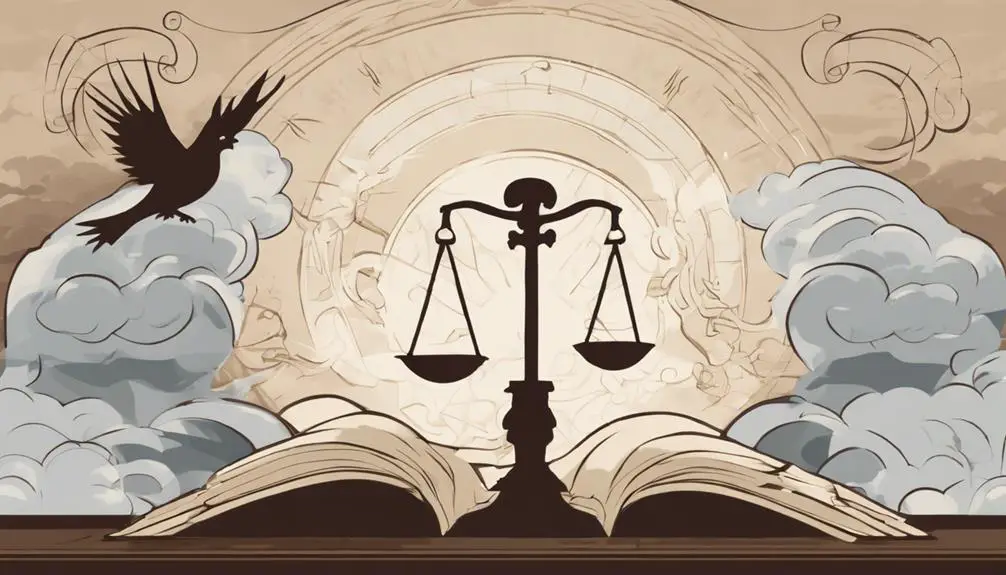An exploration of biblical stories reveals the perilous path of revenge, urging a reflection on its impacts in our lives.

Consequences of Revenge in the Bible
In the tapestry of biblical narratives, revenge is a double-edged sword, cutting both ways. You'll find that tales like Samson's bring to light the destructive aftermath of seeking vengeance, and how it often ensnares the seeker in a web of their own making.
Cain and Abel's story warns of the irrevocable split caused by envy-driven retribution, while Joseph's journey exemplifies the power of forgiveness over revenge.
As you explore these narratives, consider how the consequences of revenge are mirrored in today's world, inviting you to reflect on the timeless wisdom wrapped within ancient texts.
Key Takeaways
- Revenge perpetuates a cycle of violence and leads to destruction, as shown in Samson's tale.
- Acts of revenge, like Cain's murder of Abel, result in isolation, suffering, and a call for compassion and forgiveness.
- Stories such as Joseph's journey illustrate the transformative power of mercy over revenge, leading to reconciliation and peace.
- Biblical teachings, including those of Jesus, emphasize forgiveness and restraint over retaliation, promoting moral integrity and reconciliation.
The Story of Samson

In the biblical narrative, Samson's story exemplifies the profound consequences of seeking revenge, illustrating a cycle of violence that escalates beyond his control. Central to this tale is Samson's strength, a divine gift that becomes both his greatest asset and his eventual downfall. The Philistine conflict, serving as the backdrop for his actions, further complicates the narrative, embedding his personal vendettas within a broader socio-political struggle.
You'll notice that Samson's initial confrontations with the Philistines are marked by personal grievances. However, his responses, fueled by a desire for revenge, significantly contribute to the escalation of violence. His feats, while impressive, highlight a troubling reliance on physical power to resolve conflicts, neglecting more peaceful or diplomatic avenues.
Moreover, Samson's story serves as a cautionary tale about the dangers of letting revenge consume one's life. His actions, driven by the desire to avenge wrongs, ultimately lead to his capture and death, underscoring the futility and destructiveness of revenge. Through this narrative, you're invited to reflect on the cyclical nature of violence and the importance of seeking resolution through means other than retribution.
Cain and Abel's Legacy

Reflecting on the story of Samson, it's crucial to explore another pivotal biblical narrative that examines the consequences of revenge, that of Cain and Abel, to understand the deeper moral implications embedded within such acts. This tale, steeped in sibling rivalry and divine intervention, offers a profound look at how vengeance can shape destinies and moral landscapes.
- Sibling Rivalry: At its core, Cain and Abel's story is a tragic example of how jealousy and competition between siblings can lead to catastrophic outcomes. Cain's inability to control his envy towards Abel's favored offering to God escalates to the ultimate act of revenge—murder.
- Divine Intervention: The narrative illustrates a pivotal moment of divine intervention, where God questions Cain about Abel's whereabouts, highlighting the moral expectation for accountability and the divine value placed on human life.
- Moral Implications: The consequences of Cain's actions—being marked and cast away—serve as a sobering reminder of the long-lasting effects of revenge. It underscores the importance of mastering one's emotions and seeking reconciliation over retribution.
Through Cain and Abel, the Bible teaches that the path of vengeance leads to isolation and suffering, emphasizing the value of compassion and forgiveness.
Joseph's Path to Forgiveness

Transitioning from tales of vengeance to narratives of reconciliation, we observe Joseph's journey towards forgiveness as a testament to the transformative power of mercy over retribution. Thrust into adversity by his brothers' betrayal, Joseph's narrative shifts from victim to victor through his adept dream interpretation and eventual rise to power in Egypt. Yet, the climax isn't marked by revenge but by a profound act of family reconciliation.
You'll find in this analysis, Joseph's decision to forgive his brothers isn't a moment of weakness but a deliberate choice grounded in wisdom and understanding of his life's purpose. His ability to interpret dreams, initially the source of his brothers' envy, becomes the very tool that saves them from famine. This pivotal role of dream interpretation underscores the divine orchestration at play, guiding Joseph from suffering to salvation, both for himself and his family.
Reflecting on Joseph's path, it's evident that his journey from betrayal to forgiveness illuminates the profound impact of choosing reconciliation over revenge. It's a powerful reminder that forgiveness can lead to healing and restoration, turning enmity into amity. Through Joseph's story, the Bible advocates for a higher road, where mercy triumphs over vengeance, fostering unity and peace.
David's Response to Saul

Delving into David's narrative, we observe his remarkable restraint and moral fortitude when confronted with opportunities to avenge himself against Saul. Despite Saul's jealousy, which drove the king to relentlessly pursue David with the intent to kill, David's loyalty to Saul as the anointed king of Israel remained unwavering. This story arc profoundly illustrates the complexities of human emotions and the strength required to uphold moral principles in the face of personal vendettas.
To engage you further, consider these points:
- Saul's Jealousy: It manifested in violent pursuits, yet David chose not to exploit moments of vulnerability to harm Saul.
- David's Loyalty: Despite being anointed as the next king, he showed profound respect for Saul's position, refusing to 'lay a hand on the Lord's anointed.'
- Moral Fortitude: David's decisions reveal a deep commitment to ethical principles over personal gain or revenge.
This narrative invites reflection on the power of restraint and the importance of adhering to one's moral compass even when faced with justifiable reasons for revenge. David's response to Saul's aggression teaches a timeless lesson on the consequences of revenge and the strength found in forgiveness and moral integrity.
Jesus on Retaliation

Exploring Jesus' teachings, we find a radical departure from the traditional views on retaliation, emphasizing forgiveness over revenge. He introduces a principle that not only challenges societal norms but also lays the foundation for a transformative way of living. Jesus' directive to 'turn the other cheek,' as recorded in the Sermon on the Mount, illustrates a profound rejection of reciprocating harm for harm. This concept doesn't advocate for passivity in the face of injustice; rather, it promotes a proactive stance of non-violent resistance and unconditional love.
Diving deeper, Jesus' call to 'love your enemies' further dismantles the cycle of vengeance that had been ingrained in human interactions. He posits that true strength lies not in overpowering the adversary but in the capacity to love and pray for those who wish us harm. This teaching doesn't erase the reality of wrongdoing nor does it deny the need for justice. Instead, it shifts the focus from retaliation to reconciliation, urging us to break free from the shackles of bitterness and hatred that revenge invariably forges.
In essence, Jesus' perspective on retaliation invites us to reimagine our responses to hurt and offense, encouraging a heart posture of forgiveness that fosters healing, community, and peace.
Frequently Asked Questions
How Does the Concept of Revenge Differ Between the Old and New Testaments?
You'll notice in the Old Testament, revenge often falls within divine judgments, closely tied to the covenant context. It's about maintaining order and justice.
In contrast, the New Testament shifts focus. Here, it's more about forgiveness and leaving vengeance to God. This transition reflects a broader theological evolution, emphasizing personal accountability and divine mercy.
Analyzing these texts, you'll see a reflective journey from collective justice to individual transformation.
Are There Examples in the Bible Where Revenge Is Portrayed in a Positive Light, Outside the Well-Known Stories?
You're exploring a nuanced topic, seeking less-known biblical stories where revenge might shine positively.
It's essential to differentiate between personal vendettas and divine justice, as they're not depicted equally.
While personal vendettas are generally frowned upon, instances where divine justice is executed might be seen in a more favorable light, reflecting a higher moral or ethical rationale.
Analyzing these narratives, you'll uncover the complex dynamics of retribution beyond the surface-level understanding.
What Psychological Impacts of Seeking Revenge Are Discussed or Implied in Biblical Texts?
You're exploring how seeking revenge impacts mental health, delving into biblical texts for insights. These ancient stories hint at emotional spirals, suggesting profound psychological effects.
Reflectively, they imply revenge can entangle one's mind in negative emotions, affecting overall well-being.
Analyzing these narratives, it's clear the pursuit of revenge might offer temporary satisfaction but risks long-term mental health, illustrating the complex interplay between actions, emotions, and psychological state.
How Do Biblical Teachings on Revenge Influence Modern Christian Ethics and Legal Systems?
You're exploring how biblical teachings on revenge shape contemporary Christian ethics and legal systems. These ancient guidelines confront you with ethical dilemmas, pushing towards legal reform.
They encourage forgiveness over retaliation, influencing modern justice principles. As you delve deeper, you'll see the ripple effect of these teachings, reflecting on the balance between justice and mercy.
This analysis isn't just academic; it's a reflective journey through the complexities of moral and legal evolution.
Can the Desire for Revenge Be Reconciled With the Christian Commandment to Love One's Enemies?
Reconciling your desire for revenge with the commandment to love your enemies is challenging but necessary for your spiritual growth.
Forgiveness psychology suggests that letting go of grudges can lead to emotional freedom and better mental health.
Enemy love, as taught in Christian ethics, isn't about condoning wrong but about breaking the cycle of hatred.
It's a reflective process, where you embody compassion despite your deepest grievances.
Conclusion
In examining biblical narratives, it's evident that revenge begets a cycle of destruction, while forgiveness paves a pathway to healing and restoration. Samson's vengeance, Cain's murderous envy, and Saul's pursuit of David underscore the corrosive effects of retribution.
Conversely, Joseph's forgiveness and Jesus' teachings on turning the other cheek highlight the transformative power of mercy. These stories collectively serve as a profound reflection on human nature, urging us towards reconciliation over vengeance, embodying a deeper understanding of justice and compassion.



Sign up